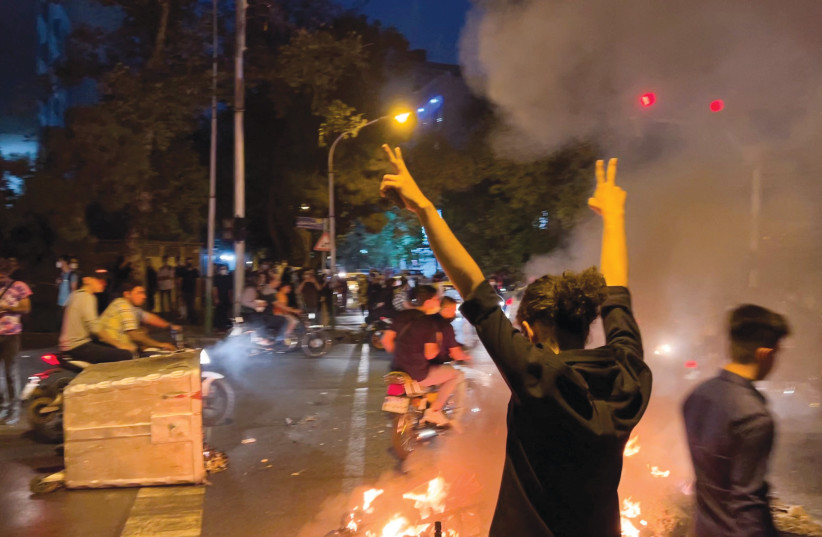The civil unrest that began in Iran on September 16 has been called “The Mahsa Amini protests,” named after the young Iranian woman who died in police custody in Tehran after being severely beaten by the Guidance Patrol, the Islamic Republic’s morality police, which accused her of wearing an “improper” hijab in violation of Iran’s mandatory hijab law.
“The 22-year-old woman emerged from the Tehran subway, her dark hair covered with a black headscarf and the lines of her body obscured by loose clothing, when the capital city’s Guidance Patrol spotted her,” The New York Times reported. “They were members of Iran’s notorious morality police, enforcers of the conservative Islamic dress and behavior rules that have governed daily life for Iranians since the 1979 revolution, and newly energized under a hard-line president who took office last year. By their standards, Mahsa Amini was improperly dressed, which could mean something as simple as a wisp of hair protruding from her headscarf. They put her in a van and drove her away to a detention center, where she was to undergo re-education. Three days later, on September 16, she was dead.”
The protests erupted hours after her death outside the Tehran hospital where she was treated and spread like wildfire to her home province of Kurdistan and then to other cities across Iran.
In response, the Iranian regime initially implemented regional shutdowns of Internet access, and as the protests grew, it imposed a widespread Internet blackout together with nationwide restrictions on social media.
Still, dozens of protesters have been killed in almost two weeks of rage and street battles that are certainly the deadliest since the 2019–20 protests which resulted in more than 1,500 fatalities. The New York Times called them the largest the country has witnessed since 2009, when demonstrations broke out in response to the reelection of then-president Mahmoud Ahmadinejad in a vote seen by many as fraudulent.

Chanting “Women, life and freedom” and “Death to the dictator,” the protesters targeted their anger at their ailing supreme leader, Ayatollah Ali Khamenei, while their current president, Ebrahim Raisi, was in New York City to address the UN General Assembly. Ironically, Raisi canceled a scheduled interview with CNN’s Christiane Amanpour after she refused to wear a headscarf.
International condemnations against the Iranian government
The international community has squarely condemned the Iranian regime’s violent response to the protests, and the US Treasury Department went a step further, sanctioning the Guidance Patrol and seven high-ranking Iranian officials.
“Mahsa Amini was a courageous woman whose death in Morality Police custody was yet another act of brutality by the Iranian regime’s security forces against its own people,” said Treasury Secretary Janet Yellen.
“Mahsa Amini was a courageous woman whose death in Morality Police custody was yet another act of brutality by the Iranian regime’s security forces against its own people.”
Treasury Secretary Janet Yellen
US President Joe Biden, in his address to the UN General Assembly, expressed solidarity with the protesters, while Secretary of State Antony Blinken tweeted that Amini’s death is “unforgivable,” announcing that the US would issue a General License allowing American companies to ignore telecommunications sanctions against Iran in order to assist the protesters in attaining Internet access.
Congresswoman Alexandria Ocasio-Cortez wrote, “Solidarity with the courageous women and allies in Iran protesting for their freedom,” while Sen. Amy Klobuchar tweeted “The women of Iran are taking to the streets, risking their lives for their rights and freedoms. I am with you, we are with you.”
International human rights organizations, including the Iran Human Rights group, Human Rights Watch and acting UN High Commissioner for Human Rights Nada Al-Nashif, issued statements of concern.
In Israel, Iranian-born singer Rita voiced her support for the protesters in Farsi with the website Iran International.
“Dear Iranians, I, Rita Yahan-Faruz, am standing with you, the Iranians, today, and especially with my dear sisters, the brave women of Iran,” she said. “Women are standing these days heroically for freedom in front of bullets. All women in the world are Mahsa Amini today.”
Just as in past protests, though, much more can be done to support the grassroots Iranian protests and the majority of Iranians who oppose the strict Islamic laws imposed in the country since 1979.
This may, in fact, be an opportunity for most of the civilized world to stand together and show the Iranian people that they do not stand alone in their quest for freedom against the brutal regime that oppresses them.
